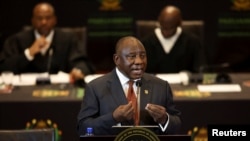In his state of the union speech late Thursday, South Africa's president, declared a state of disaster to deal with the country's electricity crisis. The emergency powers were key to helping South Africa cope with the COVID-19 pandemic. But analysts are skeptical the added powers will hasten an increase in electricity, and they worry it could feed corruption.
The main opposition party, the Democratic Alliance, plans to challenge the state of disaster in court, saying it wants to prevent the kind of looting that took place during the COVID-19 emergency, as President Cyril Ramaphosa’s action will empower the ruling African National Congress party to side-step normal procurement processes.
Professor Lisa Thompson, a political economist at the University of the Western Cape, says it is a concern expressed by many, though she notes it is heartening the president finally seemed to acknowledge the urgency of resolving the energy crisis. Power outages have been implemented on and off since about 2008.
“It’s not just a statement of intent. It’s about dealing with an actual real time crisis, which analysts and citizens feel that the president has handled badly," Thompson said. "He has sat on his hands and not resolved this issue.”
She says a recent field trip to the less developed province of Limpopo brought home the impact of the electricity crisis.
“I was absolutely horrified at how little power areas like Louis Trichardt and Messina had," Thompson said. "We had more than 12 hours of no electricity every day, a lot of it actually in the day. How businesses up there are functioning, I really do not know.”
Energy analyst Chris Yelland says he has mixed feelings about the State of Disaster being declared.
“On the one hand, I do believe that special powers would and could, if applied correctly, make a difference in expediting some of the bureaucratic process involved to deal with the energy crisis," Yelland said. "However, I do believe that up front, before declaring a State of Disaster, one needs to know precisely those actions that are going to be taken in terms of this State of Disaster. Not only actions themselves but the time frames for these actions and the cost of these actions. A State of Disaster should be limited in this way up-front and not used as an open check book.”
Yelland says past experiences of States of Disaster have not been positive and have opened the door to significant maladministration, unauthorized expenditures and corruption.
“And the kind of money one is talking about in resolving the electricity crisis is several orders of magnitude higher than that involved in the COVID crisis," Yelland said. "
Head of the business group Business Unity South Africa, Bonang Mohale, says that while members are energized by the president demonstrating a heightened sense of urgency, there also is consternation. For example, he says they don’t take a great deal of comfort in the president saying that the auditor general will be told to make sure the money is spent properly.
“External audit by definition is backwards looking. It’s like riding a car forward with your eyes on the rearview mirror," Mohale said. "We need to put systems in place to prevent corruption before it happens.”
President Ramaphosa also announced there would be a new minister of electricity based in his office soon. The person hasn’t been named yet.





